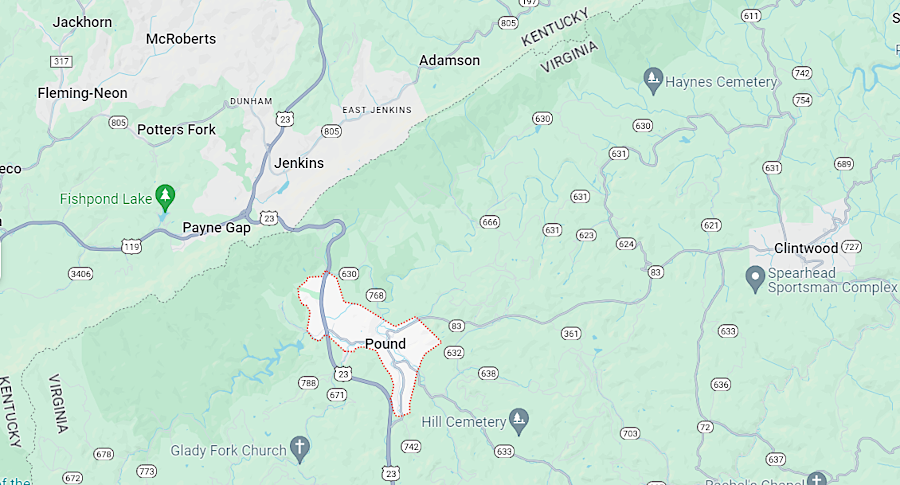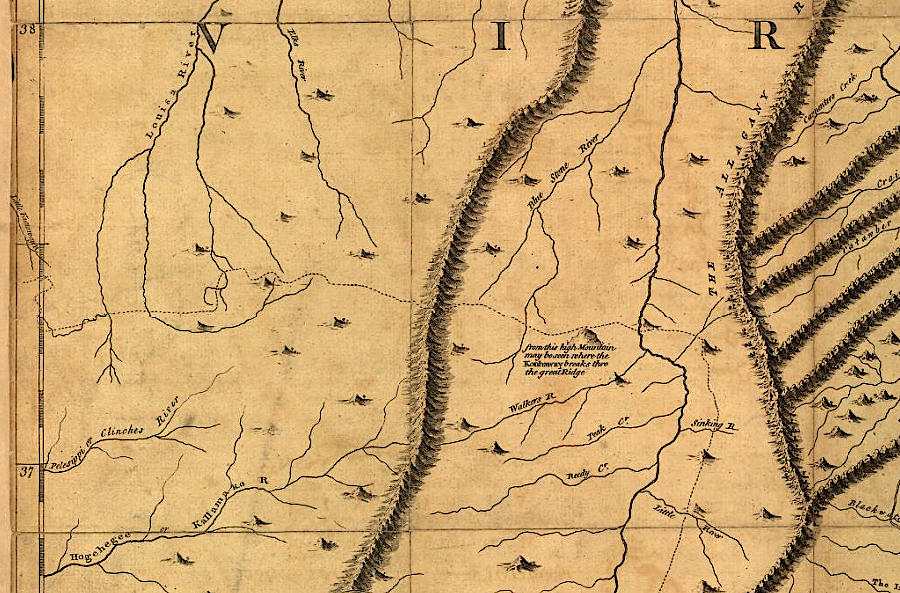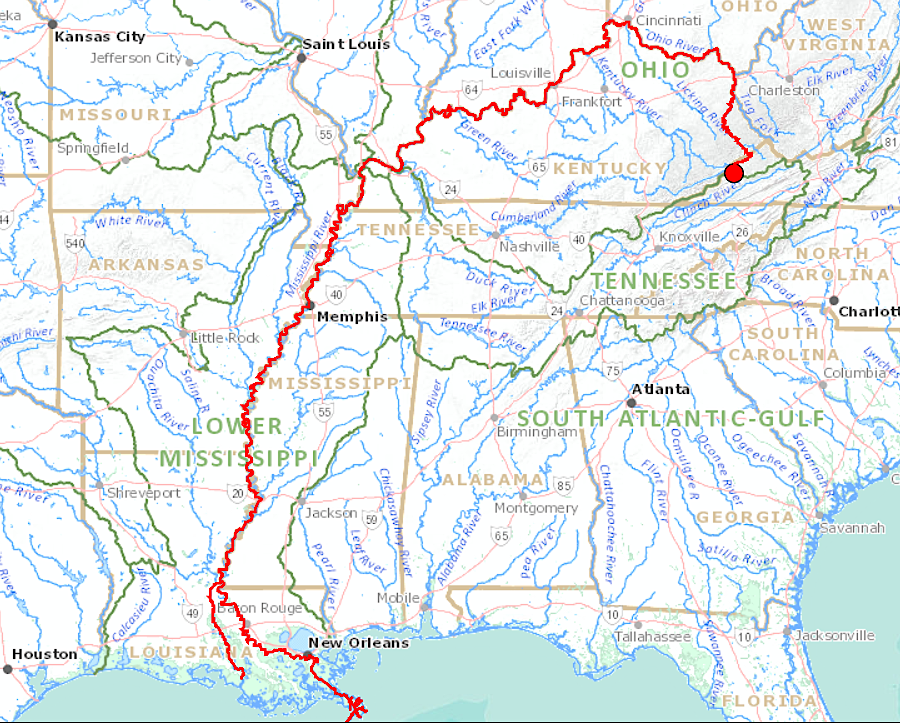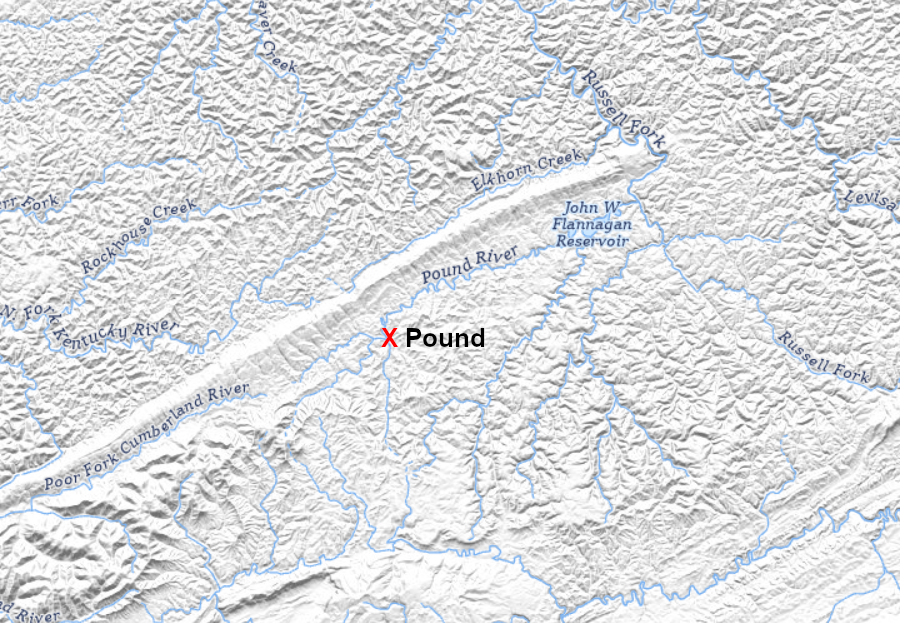
the 2020 Census recorded 877 residents in the Town of Pound
Source: GoogleMaps

the 2020 Census recorded 877 residents in the Town of Pound
Source: GoogleMaps
The area now occupied by the Town of Pound in Wise County was first explored about 15,000 years ago by Paleo-Indians. Various cultural groups hunted, gathered, and eventually farmed small plots until the arrival of European colonists in the 1700's.
In theory the Proclamation of 1763, issued by King George III after the French and Indian War, banned colonial settlement in the area. Settlers interested in the bottomlands along the headwaters of the Tennessee River overcame that constraint.

in the 1750's, Peter Jefferson and Joshua Fry were unaware of the Pound River
Source: Library of Congress, A map of the most inhabited part of Virginia containing the whole province of Maryland with part of Pensilvania, New Jersey and North Carolina (Peter Jefferson and Joshua Fry, 1755)
Iroquois claims to the land were ceded in the 1768 Treaty of Fort Stanwix. As interpreted by the English, Cherokee claims were extinguished by the 1770 Treaty of Lochaber and a side deal to it. The Shawnee had not agreed to the "Indian Line" surveyed by John Donelson in 1771, but after Lord Dunmore's War the English acquired title to the territory in the 1774 Treaty of Camp Charlotte.
Following the American Revolution, settlement was slow. The Pound River was not navigable, so crops could not be transported downstream via the Big Sandy, Ohio, and Mississippi rivers to New Orleans. Trails through the mountains were too narrow and steep for transporting the abundant timber or coal to market.


the Pound River offers no feasible way to transport products to market
Source: US Geological Survey (USGS), Streamer, The National Map
By the 1830's farmers were growing crops on the floodplains adjacent to the Allegheny Plateau rivers n the Big Sandy watershed and raising pigs in the forests on the hillsides. A water-powered mill pounded grain into flour, and the "pound mill" apparently is the basis for naming the river and the cluster of houses that became the Town of Pound. By 1856, there were finally enough people to justify the General Assembly creating Wise County.
Economic development increased in Southwest Virginia in 1887, when the Singer Manufacturing Company purchased the walnut trees in Wise County and had the logs shipped by wagon to Abingdon. The South Atlantic and Ohio Railroad reached Wise County in 1890. The Louisville and Nashville Railroad and the Norfolk and Western Railroad arrived at Norton in 1891.
Initially timber was harvested within the Tennessee River watershed, but by 1906 there were saw and stave mills on the Pound River. Narrow gauge railroads hauled logs from hillsides to mills. The railroads gradually extended branch lines into the mountain valleys as coal seams were developed to fuel factories and steam-powered locomotives. Low-cost railroad transportation finally made it cost-effective to export lumber ad coal all the way to Europe.1
Pound was chartered as a town on April 7, 1950. The Census recorded 1,198 residents.2

Pound was settled in the 1800's, but not chartered as a town until 1950
Source: US Geological Survey (USGS), Whitesburg. KY 1:125,000 topographic quadrangle (1890)
Pound thrived at the peak of the coal mining era after World War II. The town was the shopping and entertainment center for coal miners and families living in Wise and even Letcher County, Kentucky:3
As the population declined to 877 residents in the 2020 Census, stores closed and the town's tax base disappeared. However, local officials failed to adjust the town budget. The decisionmaking process broke down as members of the Town Council and employees feuded. Community trust in own government was also damaged when one employee was caught embezzling funds.4
In 2021, state officials required Pound to transfer its water and sewer system to Wise County after the town failed to meet water quality regulations with wastewater discharges. The release of untreated sewage violated a consent order which had been signed in 2016 after previous problems had been documented. The town had planned for a Federal/state grant to fund the necessary wastewater upgrades, and obtained a $400,000 loan to begin engineering studies. Embezzlement by an employee and failure to complete annual audits blocked the option of getting a grant. When Pound stopped making its loan payments, the town's bank account was frozen.
The Attorney General's office warned that Pound faced up to $30 million in penalties unless the system was transferred to the Wise County Public Service Authority. After the transfer, the county raised rates to fund deferred maintenance on the system.
Pound was politically dysfunctional. The mayor had been elected in 2020, and she had been the only candidate on the ballot - but another candidate received the same number of votes in a write-in campaign. A name was drawn out of a hat to determine the winner. After that process, the town council refused to follow precedent and appoint the new mayor as town manager.
That rejection was designed to keep her in just a ceremonial role as mayor, except for casting tie-breaking votes. The council then locked the mayor out of town hall, and three of the five members signed a petition asking for the Circuit Court to remove her from office. The court declined the request.

the Town of Pound developed along the Pound River
Source: ESRI, ArcGIS Online
The Town Council fired its attorney, with the mayor casting the tie-breaking vote in a 3-2 decision, and disbanded the police department. State officials then required Pound to hire a temporary police chief in order to comply with state mandates for protecting the evidence room.
With no attorney, no town manager, and no town clerk, most town operations ceased. There were three vacancies on the five-member town council at the end of 2021. One member had refused to attend meetings and prevented a quorum which would allow for conducting official business. He finally resigned at the end of 2021 in what he called a "kamikaze" effort to force the chief judge in the Circuit Court to appoint people to fill the vacant positions.
The Majority Leader in the House of Delegates, Terry Kilgore from nearby Gate City, responded to what he called a "hot mess." He filed a bill in the legislature to revoke the town charter, saying:5
When 2022 General Assembly considered a bill to revoke the charter of "The Pound," there was a community reaction. The mayor and one remaining council member petitioned the local court to appoint three new members to the Town Council, so it would have enough for a quorum and could take official votes.
In March, 2022, the Lee County Circuit Court appointed three new council members to join the remaining two members plus the mayor. One of the two remaining members had traveled to the General Assembly to ask that Pound residents be given time to correct the issues before the charter was revoked. In response, the legislature passed a charter revocation act but postponed action until Nov. 1, 2023, giving the town an opportunity to establish effective government operations again.
The member of the Pound Town Council was successful in her request to the legislators:6
However, as a sign of the local disfunction, one of the court's appointees immediately declined to take the seat. He had been a former mayor and town manager, and had signed the petition attempting to recall the current mayor. He had not applied for the position, but a member of town council had suggested his name and the judges chose him without determining his level of interest.7
The court quickly appointed a replacement. In March 2022, three months after the last Town Council meeting, a full set of Town Council members unanimously approved a 10-point agreement with the Virginia Municipal League that required being polite and professional with each other, saying that the members:8
Despite the efforts to restore standard governing procedures, the drama in Pound continued. In May, 2022, the town mayor resigned during a Town council meeting. She announced her resignation was effective immediately, eight months before her term was to end, saying:9
With assistance from the Virginia Municipal League, the Virginia Department of Environmental Quality (DEQ), and non-government organizations such as The Nature Conservancy and Appalachian Voices, the Town Council gradually established credibility. Taxes were collected regularly by 2024 and expenses had been reduced to match available funding, but the fiscal problems were still a challenge. The lack of audited expenses for the last four years made it difficult to apply successfully for grants that would help Pound shift from a coal-based to a tourism-based economy.
One town employee summed up the challenge:10
In 2024, Pound voters elected two new members to the five-person town council who proposed to disincorporate the town. The council then began discussions with Wise County of how services might be provided if the town charter was abandoned.11